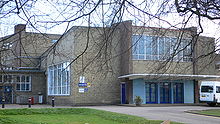52°14′50″N 0°06′58″E / 52.247093°N 0.116214°E

The village college is an institution specific to Cambridgeshire, England, including the Peterborough unitary authority area. It caters for the education of 11- to 16-year-olds during the day, and provides educational and leisure facilities to the wider community out of school hours.
Village colleges were the brainchild of Henry Morris, the then Chief Education Officer for Cambridgeshire,[1] who had a vision of a school that would serve the whole community, stem migration from the countryside to the towns, and provide a decent education to pupils who had previously only been served by the upper years of elementary schools. His original plan was that the site of the college would also be home to the village's other public services.[2] The first, Sawston Village College, opened in 1930 with Bottisham, Linton, and Bassingbourn following a few years later.[3] Under Morris' influence, many of the colleges have had distinguished architects, notably the one at Impington designed by Walter Gropius and Maxwell Fry.[3]
Between the implementation of the Education Act 1944 and Cambridgeshire's adoption of the Comprehensive school system in 1974, village colleges were effectively reduced to secondary modern schools, apart from Sawston which operated both a grammar and a secondary modern scheme. Since 1974 village colleges have returned to their original mission as schools for the whole community. Most of the colleges are now parts of larger, multi-academy trusts.[3]
There are village colleges throughout Cambridgeshire, including Bassingbourn, Bottisham, Comberton, Cottenham, Impington, Linton, Melbourn, Sawston, Soham, Swavesey and Witchford.[note 1] The most recent, Cambourne Village College, opened in September 2013.[4]
- ^ "School pioneer Henry Morris, who founded 'cradle to grave' village college system is celebrated with blue plaque". Cambridge News. Retrieved 4 March 2016.
- ^ "Education reformer Henry Morris gets memorial plaque". BBC News. 30 September 2013. Retrieved 7 March 2016.
- ^ a b c Bennett, Oliver (17 November 2015). "Bauhaus and moral purpose: the very model of modern community schools". The Guardian. ISSN 0261-3077. Retrieved 4 March 2016.
- ^ "Cambridgeshire: New Schools Cost Millions". Heart Cambridge. Retrieved 4 March 2016.
Cite error: There are <ref group=note> tags on this page, but the references will not show without a {{reflist|group=note}} template (see the help page).